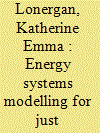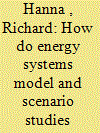| Srl | Item |
| 1 |
ID:
192792


|
|
|
|
|
| Summary/Abstract |
Policymaking increasingly targets an energy transition that is not only low cost and low carbon, but also just. While energy system models have been useful policymaking tools towards achieving the first two objectives, it is yet unclear to what extent they can also support a just transition. Here, we review 73 recent energy systems modelling studies using an analytical coding frame and observe a diversity of approaches to account for energy justice. While models do show promise in being able to support a just transition, especially in terms of assessing distributional outcomes, many of the approaches in the literature are poorly connected to current energy justice goals and discourses, decreasing the studies’ policy relevance and leaving policymakers with suboptimal planning support. Based on our results, we suggest eight actions for modellers to increase the policy relevance of their studies, which include more direct engagement with policy and research discourses, developing location-specific case studies, leveraging public participation in the modelling process, and considering asset decommissioning.
|
|
|
|
|
|
|
|
|
|
|
|
|
|
|
|
| 2 |
ID:
177368


|
|
|
|
|
| Summary/Abstract |
Scenarios may be qualitative or quantitative, the latter of which can be developed using energy systems models. This study explores how different energy systems models and scenarios explicitly represent and assess potential disruptions and discontinuities. The focus is on futures studies and forward-looking scenario and modelling exercises. We apply definitions of ‘emergent’ (uncoordinated) and ‘purposive’ (coordinated) disruption to a systematic review on how energy systems models and scenarios have been used to capture disruption and discontinuity. We first conducted a review of reviews of energy models and scenarios to provide an overview of their common classifications. Additional searches then sought studies which use different types of models and scenarios to explore disruption and discontinuity. We analyse a subset of 30 of these modelling or scenario studies in which authors self-identify and represent disruption or discontinuity, finding that the most frequently used methods were qualitative, exploratory foresight scenarios or agent-based models. We conclude that policy makers could prepare more effectively for social, economic and political disruption by integrating multidisciplinary insights from social and political sciences, engineering and economics through a broader range of methods: exploratory, foresight scenarios, simulation and agent-based models and repurposed energy systems optimisation models.
|
|
|
|
|
|
|
|
|
|
|
|
|
|
|
|